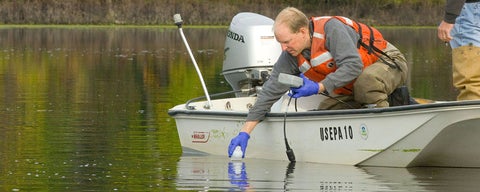
Rebecca Rooney contributes to binational initiative to standardize microplastics research
An International Joint Commission’s Work Group focuses on environmental monitoring and ecological risks of microplastics in the Great Lakes.
A top expert in biomonitoring and ecosystem assessment at the University of Waterloo is co-leading an International Joint Commission (IJC) Work Group to develop and propose coordinated frameworks for microplastics monitoring that have the potential to shape microplastics research in the Great Lakes region and beyond.

Water Institute member Dr. Rebecca Rooney, Professor in the Department of Biology, has been a member of the Great Lakes Science Advisory Board of the International Joint Commission since 2018. One of the key goals of the Advisory Board is to provide advice and expertise on scientific matters that are identified as a priority by the IJC, including microplastics.
The issue of plastic pollution has been on the IJC’s radar since at least 2015 when they began evaluating the state of microplastics and management within the Great Lakes basin. In 2016, they hosted a workshop with the intent to compile local progress and identify gaps. As a result, the IJC released a list of 10 recommendations on microplastics related to science and research, policy and management, and education and outreach. Through this work, the IJC acknowledged the importance of harmonizing monitoring approaches to be able to fully understand the impact of microplastics pollution.
Eight years later, harmonization between researchers remains a significant challenge. The study of microplastics is still relatively new and researchers are still working to develop the most effective methodologies and techniques for understanding microplastic pollution. As such, there is little consistency in how research teams undertake field sampling, analyze samples in the laboratory, and report on results. This effectively limits the ability to compare and aggregate results across studies.
To summarize the recent advances in microplastics research and make recommendations to better harmonize future efforts, the IJC Science Advisory Board launched a new Microplastics Work Group in 2023, co-chaired by Rooney, Dr. Karen Kidd of McMaster University, and Dr. Chelsea Rochman of the University of Toronto. The Work Group is working collaboratively with experts from the United States and Canada to understand the trends in microplastic contamination levels and the real-time and future risk for the Great Lakes environment and its residents. This is critical for determining the best approach to managing plastics.
The IJC Work Group therefore began thinking about ways to standardize microplastics monitoring and risk assessments.
“Harmonization of sampling and reporting methods is so important in the Great Lakes, where we have the US and Canada, eight US states, a province, as well as multiple Tribes and Indigenous communities all responsible for jointly protecting our shared waters, but each with different agencies, rules, and resources to put to the task. We need to be measuring in the same units to put the pieces together and solve the puzzle of Great Lakes stewardship,” said Rooney.
Microplastics aren’t only a Great Lakes challenge, and the IJC Work Group sought to partner and capitalize on efforts being made by other groups across North America from the very start. For instance, the Southern California Coastal Water Research Project (SCCWRP) was already working on standard laboratory methods, as well as the reference materials necessary for quality assurance. Instead of duplicating those efforts, the IJC Work Group decided to support SCCWRP in their efforts and develop related Standard Operating Procedures for environmental monitoring in the Great Lakes context.
To begin, they collaborated with a broad set of stakeholders in the Great Lakes region including the United States Geological Survey, the Army Corps of Engineers, National Oceanic and Atmospheric Administration, Environment and Climate Change Canada, the National Research Foundation, and others. They had an extensive co-creation plan that included hosting two workshops; one to develop a framework for monitoring microplastic pollution, and the other to provide tools for interpreting those monitoring data in a risk assessment framework with associated management action recommendations. They also connected with the Great Lakes research community at the IAGLR conference.
These conversations made it clear that understanding the toxicological impacts of plastic pollution would be critical. Many toxicology studies have been done in the lab, but these studies focus on relatively few types of microplastic, few types of test organisms, and unrealistic exposure concentrations. Such that we know surprisingly little about the level of microplastics that aquatic organisms are being exposed to in the Great Lakes or what level is likely to be toxic to Great Lakes species. This gap in science leaves decision makers with inadequate information about how plastic pollution is and will affect the health of aquatic ecosystems. Even less is known about the effects of plastic on life in the Great Lakes because most of the research has been focused on the impacts in oceans.
While evidence of concern is quickly mounting, there is still a lot of uncertainty. We cannot yet say how much pollution is too much, or what monitoring thresholds and alerts should be. We also have not collectively agreed on the best monitoring approach, explained Rooney, “but the efforts of the Microplastics Work Group took us a big step closer to this for the Great Lakes.”
Nailing down these answers will importantly contribute to any binational efforts to track the extent of plastic pollution in the Great Lakes and support efforts to reduce risk posed by plastic pollution to the environment and human health.
If approved by the IJC commissioners, the results of the working group should be released in the coming months.
Listing photo by USEPA Environmental-Protection-Agency